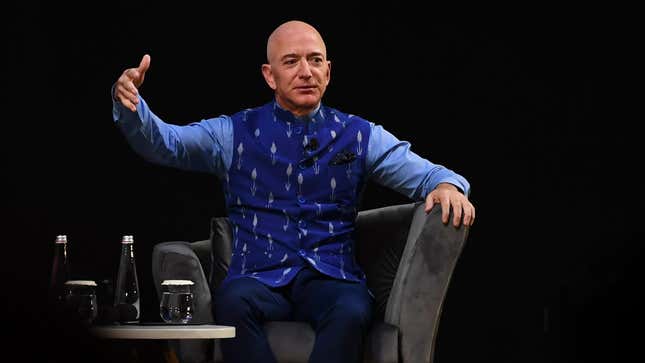
Reuters has uncovered damning evidence about the extent to which Amazon has systematically planned to rip off its third-party sellers in India—to the extent that it’s virtually impossible for the company to keep up a years-long charade.
According to documents obtained by the outlet, Amazon’s India branch employed a detailed campaign to collect private data about sales, use the same end-stage manufacturers to precisely replicate products, and boost their own competing brands in search results.
Reuters claims that two senior executives of Amazon’s international business evaluated the plan.
It vindicates years of reports and complaints from employees and smaller businesses that the company has taken information from captive merchants and used it against them. Reuters reports that, in an internal 2016 document, Amazon literally described its plan to promote its India-based household supply brand Solimo as: “use information from Amazon.in to develop products and then leverage the Amazon.in platform to market these products to our customers.”

According to Reuters, the 2016 documents show that Amazon sold Solimo products at a 10% to 15% lower price than its competitors. Documents also showed that they’d intended to use the same manufacturers as third-party sellers to create their imitation products, even replicating the measurements of shirts by John Miller, a favored brand in India. They’d then planned to list their products second or third in search results.
The company has denied related reports that it collected data about other brands’ sales in order to promote their knock-offs. Jeff Bezos claimed in a Congressional antitrust hearing last year—the company’s most profitable ever—that he “can’t guarantee” that the company never violated its policy against using seller data to peddle their own competing brands. The company is currently facing an antitrust probe in India, adding to investigations in Europe and the US.
Last year, the company was fined $888 million for allegedly violating EU data protection regulations, practically pocket change for a company that pulled in $386 billion in revenue in 2020.
In February, Reuters reported that over 400,000 third-party India-based sellers listed their products on Amazon. As of March 2021, the e-commerce data firm Marketplace Pulse reported that Amazon’s India market was growing three times as quickly as that of North America.
Amazon has not responded to Gizmodo’s request for comment, we’ll update this post when they do.
Update 10/13/2021 5:30 pm ET: In a statement shared with Gizmodo, an Amazon spokesperson said:
“As Reuters hasn’t shared the documents or their provenance with us, we are unable to confirm the veracity or otherwise of the information and claims as stated. We believe these claims are factually incorrect and unsubstantiated.”
They added that Amazon has a strict policy prohibiting the company or employees from using or sharing “non-public, seller-specific data for the benefit of any seller, including sellers of private brands,” and that the companies investigate employees reported to have broken it. They also said that Amazon shows search results “based on relevance,” regardless of the brand.